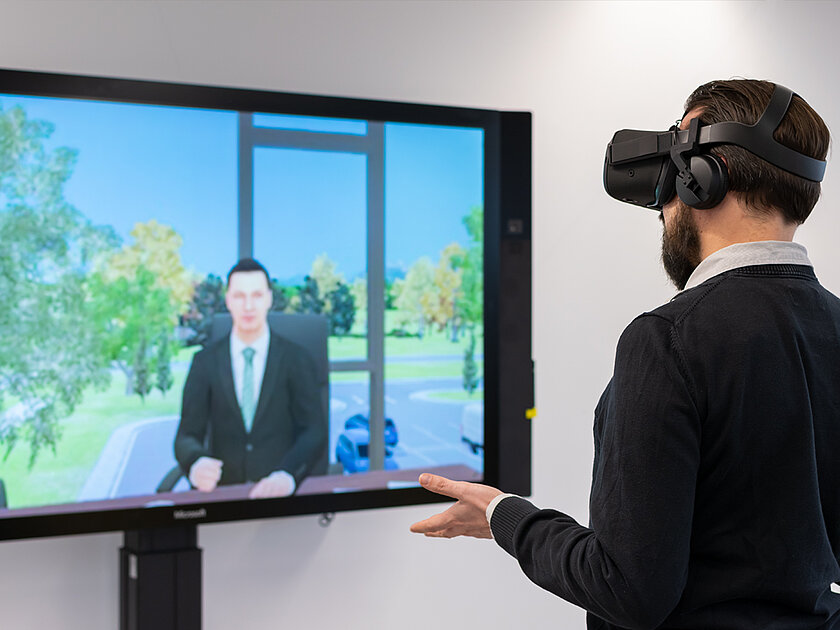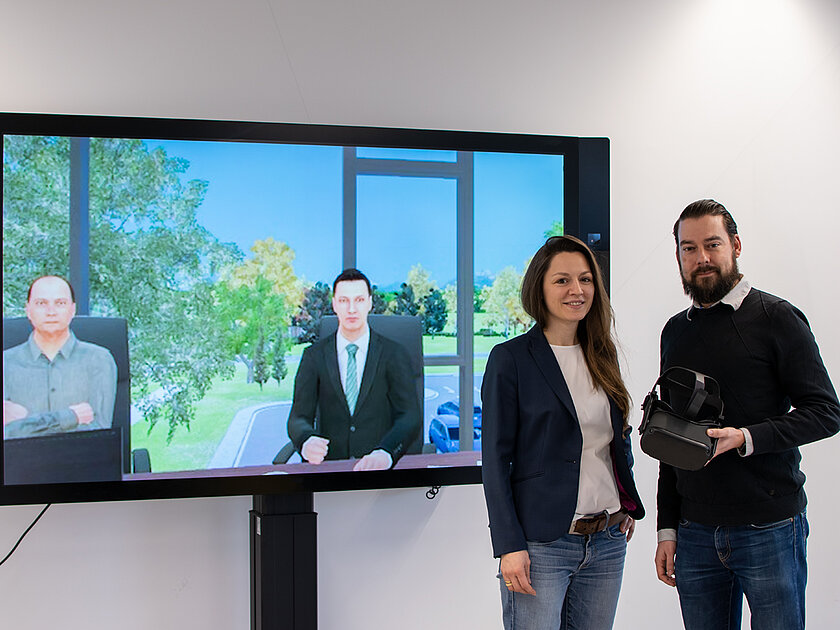Jan Fiedler has been a research assistant at HNU since 2018. His field of work encompasses everything to do with augmented and virtual reality - in the InnoSÜD subproject "Mixed Reality Concepts", for example, he is dedicated to the question of how knowledge transfer can be designed using mixed reality methods. He also supports other subprojects in this area, for example in setting up the mixed reality lab in Innovation Space. The virtual negotiation training "Beat the Bot" of the team around Prof. Dr. Alexander Kracklauer, Barbara Dannenmann and Jan Fiedler was developed in the subproject "Sales Lab", which deals with innovative methods in sales.

Beat the Bot
The virtual negotiation training of the InnoSÜD subproject "Sales Lab" was developed at the Competence Center for Growth and Sales Strategies (KWV) of HNU together with the company partner TriCAT GmbH. The prototype makes it possible to enter into a conversation with a bot at the virtual negotiation table. By combining speech recognition, artificial intelligence and machine learning in a VR environment, it is possible to simulate natural negotiation situations that can be used in sales training independent of time and location.
[1]
How did you come up with the idea of developing a virtual negotiation simulation?
At the Competence Center, we have been working on the topic of negotiation theory in teaching and research for over ten years. Our goal is to at least partially automate training processes in this area with an AI-controlled VR training. Our practice partners Tricat and ZwickRoell provided the technology and sales expertise: Tricat brought and continues to bring its know-how in software development and AI/machine learning, ZwickRoell its know-how in the area of negotiations.
My colleague Barbara Dannenmann conducted creative workshops using design thinking methods to develop various ideas for innovative sales methods. It quickly became apparent: There are various training courses in sales training, at the end of which there is usually rehearsal via role play - but basically no one really feels like doing these role plays. You have to pretend, even though you know your "negotiating partners", i.e. your colleagues, well, and the costs for role-playing account for up to 40% of the training budget. We therefore asked ourselves: How could we turn this into a virtual training? This basic idea then developed very quickly, and we set up initial test runs with VR glasses in a virtual environment in which the negotiators sit opposite an avatar. It was important for us to design the setting as naturally as possible: People shouldn't have to click on artificial dialogs, but should be able to interact with natural language.
[2]
What is special about "Beat the Bot"?
Our negotiation simulation combines speech recognition, artificial intelligence and machine learning in a VR environment - this is unique in this form. In negotiation training, it is possible to communicate naturally with the avatars, and they respond just as naturally. This makes the dialog as real as possible. Our partner TriCAT implemented this with its experience in software, and this is how our prototype was created at the beginning of 2020. We also applied to various tenders with this - and were awarded two prizes in 2020: In August, "Beat the Bot" was awarded the DIVR Science Award, and in December, the project received the Community Award of the NextReality.Contest in Hamburg.
Virtual Reality
refers to the creation and perception of an artificial, simulated reality through specific hardware and software.
In computer-generated virtual reality (VR) environments, the real outside world is completely hidden, while augmented reality (AR) adds virtual elements - such as holograms - to the real outside world with computer support. Mixed reality (MR), in turn, enables the interaction of virtual elements and the real world.
Immersion
(lat. "immergo": to immerse, to sink).
In VR, immersion refers to the degree to which users are "immersed" in a virtual world. The more plausibility illusion (How close to reality is the virtual simulation designed?), location illusion (How pronounced is the impression of being in another place?) and involvement (How strong are interest and attention?) the virtual reality creates, the stronger the immersive effect and the more it is perceived as real.
[3]
What happened with the prototype - and what are your next steps?
After we had put the prototype through its paces with our target group, we conducted an initial study to compare the VR setting with a classic role-playing game. And we found out: the learning success in "Beat the Bot" is actually even higher than in the "analog" role-playing game.
The focus of this study was primarily on subjective perception - in our current study, we now want to back this up with more data and compare VR and classic role-playing games, primarily using body function measurements. Our main aim is to show what added value virtual negotiation training has compared to classic training. The basic idea is to keep a classical training part about negotiations, but to realize the exercise part in VR - this saves time and money, because the training can be carried out independent of time and location. You can also do it on the computer without VR glasses and enter into dialog with the avatars; but of course it's more immersive with glasses. We have stored the basic technology - now we would like to expand our application with an editor in the medium term. Currently, the negotiation training with the prototype is based on a single, exemplary negotiation situation or tactic - in this case the salami tactic - which can be played through. In the future, trainers can use the editor to adapt the application themselves to various negotiation situations. This would theoretically make a wide variety of conversation situations conceivable, from salary negotiations to doctor's interviews. Our study is scheduled for publication in the summer of 2022; work on the editor will probably start in the fall of 2022.

Test persons wanted
In its current study, the Beat-the-Bot team is collecting further data on how this unique technology-supported negotiation training compares to presence-based role-play training in terms of its impact on users. In addition to the chance to experience AI-powered VR training for themselves, participants will also receive an expense allowance of 15 euros. The experiment will take place on several dates in March at the "Innovation Space" across from HNU at John-F.-Kennedy-Strasse 7 in Neu-Ulm.
Participants must be fluent in English and must not have any epileptic disorders. The trial lasts about 30 minutes; previous knowledge of negotiation is not required. Registrations are possible by mail to kirill.semenkin@hnu.de.
Interview partner

Jan Fiedler
is a research associate for the field of Virtual / Augmented Reality and works in the InnoPROF project for the subproject "Virtual University Fair".
When I am not researching / working, then...
... I drive my oldtimer through the beautiful Allgäu.
My current reading:
"Read Player Two" by Ernest Cline.
My area of expertise in a few words:
Knowledge transfer with immersive media
My next publication / research project will be ...
... a study comparing VR and role-playing games.






